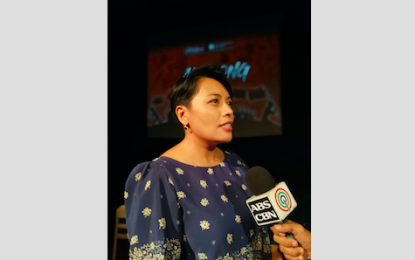
WOMEN EMPOWERMENT. Dulaang Unibersidad ng Pilipinas Artistic Director Banaue Miclat-Janssen says ways on how women perceive sexual harassment has gradually changed -- from physical to merely little gestures -- but still scars as much, in an interview in UP Diliman on Tuesday (July 23, 2019). The group acknowledges President Rodrigo Duterte's signing into law the Bawal Bastos Bill this year. (PNA photo by Christine Cudis)
MANILA -- Driven by a common goal to continue inspiring change, a theater group celebrates its 44th season through performing plays depicting some of the most challenging times for women in Philippine history.
Dulaang Unibersidad ng Pilipinas' 44th and UP Playwrights' Theatre's 28th Theatre Season present "Daluhong", which features prevailing social issues across different time periods.
Dulaang UP Artistic Director Banaue Miclat-Janssen, in an interview in a press launch on Tuesday in UP Diliman, Quezon City, said theater is an artistic expression of sharing stories often left out on history books.
The season lineup includes:
The House of Bernarda Alba | Ang Tahanan ni Bernarda Alba
Direction: Alexander Cortez
Sept. 6 - 29, 2019
Federico Garcia Lorca’s last play, La Casa de Bernarda Alba, centers on the events inside the house of Bernarda Alba, a domineering matriarch who imposes an eight-year mourning period on her household after her second husband’s death. The period isolates the family and builds tension within the household as Alba’s daughters rival against each other in marriage, inheritance, and command. The play explores themes of oppression, religious hypocrisy, familial obligation, and envy.
Fuente Ovejuna
Direction: Tony Mabesa
Nov. 8 - Dec. 1, 2019
Based upon a historical incident that took place in the village of Fuente Ovejuna, Castile in 1476, the play deals with an uprising against the cruel, sex-crazed feudal overlord, Commendador Fernan Gomez De Guzman. Aggrieved, the villagers of Fuente Ovejuna bond together to slay an autocrat. What ensues is a tale of triumph amid tribulation, as common folk seek freedom from the chains of tyranny with the words, “Fuente Ovejuna did it.”
Nana Rosa by Rody Vera
Direction: Jose Estrella
Feb. 28 - March 15, 2020
Returning to the stage after a successful run last season, Nana Rosa recounts the life of Rosa Henson, the first Filipino to publicly come out as a Comfort Woman in 1992. It follows Nana Rosa's story, from her early years in Pampanga, to her capture during the Second World War, going public, and her later years after coming out as a Comfort Woman.
“Just this year, the Bawal Bastos Bill was enacted into law by President Rodrigo Duterte and that is a good indication that (these are) better times but we should not stop there,” Miclat-Janssen said, adding that Dulaang UP shall continue informing young people about the events of the past and how gradually they have changed through time, so they can appreciate history.
President Duterte has signed into law the anti-bastos bill on April 17 which charges penalties on a range of acts from catcalling, sexist slurs, stalking and cyberstalking.
One of the law’s principal authors, Senator Risa Hontiveros, earlier said that the proposed measure had lapsed into law.
Republic Act 11313 or the "Safe Streets and Public Spaces Act" seeks to prevent gender-based sexual harassment from occurring in streets, public places, online workplaces, and educational and training institutions.
The plays will show at Wilfrifo Ma. Guerrero Theater, 2nd floor of Palma Hall in UP Diliman, Quezon City. (PNA)
